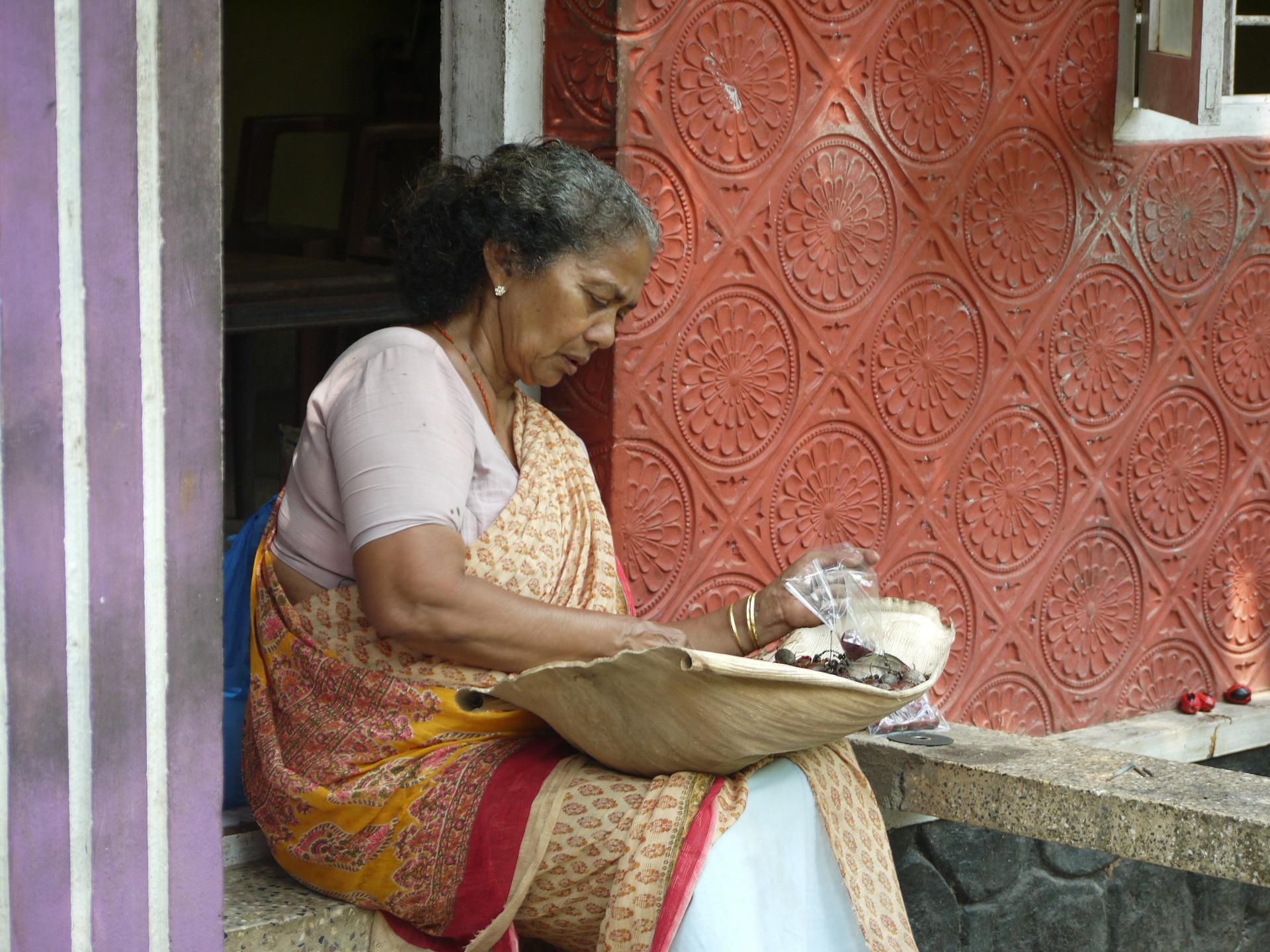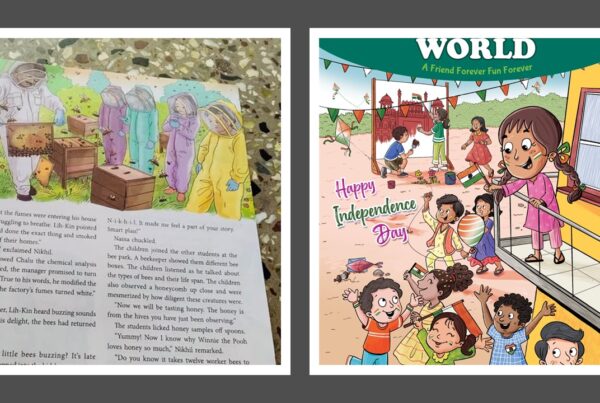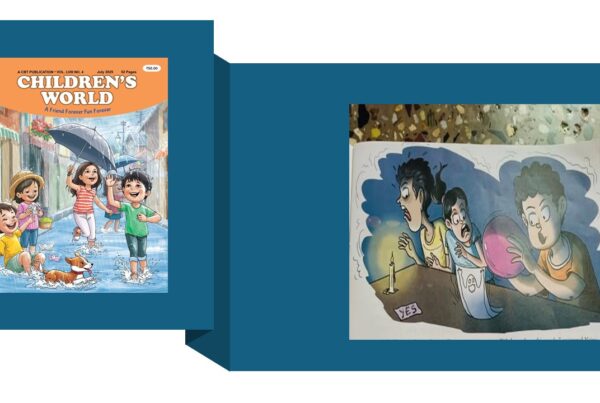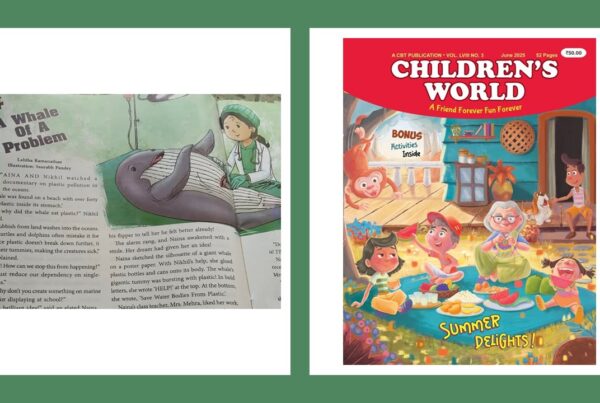This Blog won the Muse of the Month Contest Organized by Team Women’s Web.
“Amma, you are all alone. It’s not safe. The daily COVID statistics are giving us anxiety. If you don’t want to fly to the US, consider traveling to Mumbai to stay with Rajesh. It will give us some peace of mind.”
Ranjini begged her mother, Parvathy Amma.
“It’s OK. I’m comfortable where I am. Don’t talk about COVID. It’s so depressing. That’s all that the news channels are broadcasting, ten times a day.
How is my son-in-law doing? Tell me about my grandchildren. Has Gopu started to walk yet? Is Gita speaking some Tamil at least?”
“Amma, don’t change the subject. What will people say? That we abandoned our old, widowed mother? At least will you give it some thought?”
“Stop the drama. I will think about it and message you.”
Parvathy cut the call. Her eyes fell on the framed photo of her late husband, Narayanan. She smiled fondly.
“That was Ranjini. She says I must go and live with her or with our son, Rajesh. She says I am alone!”
Parvathy sighed. It wasn’t as if the photo could answer back. She looked at the walls of their house, the home they had saved for, and built brick by brick. The paint was peeling and would need a new coat soon, no doubt. Perhaps when the pandemic settled down. Each corner of this house was special.
There was that big armchair on the veranda, where her husband would relax, after a hard day at work, fanning himself with a straw fan. She would serve him his favorite black tea while the children did their homework by the light of the hurricane lamp.
She remembered the day they had moved into this house. Her husband, her mother-in-law, Ranjini, then an energetic five-year-old, and a toddler Rajesh whom she had carried into the house on her hip. How excited they had been. How had the years flown by?
Parvathy’s heart filled with pride. They had raised two children, educated them, and made sure that they lacked for nothing. They had done well. The elder one was in the US, working as a Finance Manager. The younger one was doing his doctorate, that too at IIT Mumbai. Both were married and settled.
Her husband had been her rock throughout. He had stood six feet tall, a man of action who could barely sit still for five minutes. He had been her tower of strength. She had fallen in love with him, the day she had set her eyes on him when her parents arranged their match. Thirty years of marriage. He had never raised his voice against her, not even once.
And then, three years ago, one terrible day, he crumbled. Stroke, followed by partial paralysis. The children had rushed home, leaving behind their jobs and families. They had taken turns to spend time with their ailing father, hoping he would recuperate.
She had sent them back, saying that she could manage. After all, they had their lives too. Thankfully her husband had been prudent, and they did not lack financial security. Not that it mattered, because her children transferred money every month, despite her feeling embarrassed. She felt proud that they wanted to take care of her. Not that she would accept their offer.
Parvathy was good at taking care of people. That’s what she did. All her life, she had taken care of others-first of her ailing mother-in-law, the one that taunted her and made life difficult by accusing her of enchanting her only son.
Then she took care of her children. And finally, when her husband’s stroke rendered him an invalid, she took care of him like a child.
The stroke took a toll on all of them. His body became thin and frail. Her once raven-black tresses that she was so proud of turned white overnight. The house no longer sparkled as she had other priorities. And finally, the garden. When she turned all her strength towards the care of her husband, the plants wilted away, and the once lush garden became barren.
When her husband died a year ago of a second stroke, she had felt deep pain, an emptiness, and then relief. She could not bear to see him like this. At least he was free. But where did that leave her? Did someone have to take care of her now?
Before he died, his speech was slurred but his words came out clear. “Paru. Whatever happens, do not leave this roof. This your house, your home. Our children are good. They will take care of you, but you will be at their mercy. Be independent till your last day.”
“‘Perhaps there is an advantage in being alone,’ she remarked. ‘One is spared the worry. I need worry only about myself.’ She shook her head. ‘And I have learnt not to worry overly about myself. What is the worst that can happen, after all?’ She looked up. “
She addressed her husband’s photo again.
“If I go to the US and live with Ranjini, they will expect me to take care of their children. I love my grandchildren to bits, but this is the age to mollycoddle them, not to be a caregiver. Both she and her son-in-law work long hours. She barely knew the names of the neighbors. And what about life in the US? A country that I barely understand, cooped up in a small apartment with no friends.
If I go to Rajesh’s house in Mumbai, it’s pretty much the same story. Only it gets worse here because I have my beliefs and traditions and my daughter-in-law may or may not appreciate my interference. She is nice, but then again, we have always maintained a respectful distance.
The next thing you know, I will be going ping-pong between two houses. It’s ironic how we raise two children with ease but taking care of one parent is hard.”
She reflected on the past six months following her husband’s death. The house was filled with calm and quiet. Life had been peaceful. She had fallen into a routine. Every morning she woke up at 5:00 AM listening to MS’s Suprabhatam. She would cook and eat what she liked. No special diets to follow anymore. She would clean the house, listen to music and sing along.
In the evening, she would lean across the wall, sip her tea and chat with her neighbors. Neighbors whose names and lives she knew everything about, whom she could count upon. She would spend the rest of the evening gardening and hoping her jasmine garden would bloom again. In its heyday, she remembered plucking jasmines and weaving them together into gajras that her daughter would adorn on her hair and garlands for the Gods in her prayer room.
It was amazing how tightly knit the community in her hometown was. If she needed medicines or help, one phone call and members of the resident’s association would materialize. Perhaps that was the advantage in staying in a small town over a big city-you could never be alone. Even with the COVID situation, people dropped by, leaving masks and supplies and checking on the elderly.
But most of all, this was the house where she had known her husband’s love. The house, whose every nook and cranny carried his memories. She thought to herself. How can I be alone when I feel his presence continually?
She made up her mind and shot a text to her children on the family WhatsApp group.
Children, I appreciate your concern. I am safe here. You go on with your lives. I have cared for many people in my lifetime, and now I want to take care of myself, to spend time doing the things I have always wanted- whether it is listening to music or learning the Bhagawad Gita. I know you will be there for me when I need you. But for now, I’m happy where I am.”
Decision made, she got to work on the garden, humming a tune and watering her potted plants. She noticed something that she had not noticed before. For the first time, a tiny bud had emerged on the Jasmine plant. After so long. This was a new beginning.




